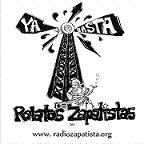
Audio
Visit to prisoners from La Voz del Amate and in solidarity with La Voz del Amate, on the 6th anniversary of its foundation
On January 8, we visited the prisoners from the organization La Voz del Amate and in solidarity with La Voz del Amate, to celebrate its sixth anniversary. Below, audios from the event and interviews to some of the prisoners.
Alejandro Diaz, Alberto Patishtan y Pedro Lopez Jimenez[podcast]http://www.archive.org/download/AlejandroDiazSantisAlbertoPatishtanPedroLopezJimenez/AlejandroDiazSantisAlbertoPatishtanYPedroLopezJimenez.mp3[/podcast]
Olmeca Hip Hop[podcast]http://www.archive.org/download/ParticipacionOlmecaHipHop/ParticipacionOlmeca.mp3[/podcast]
Palabras Rosario Diaz Mendez[podcast]http://www.archive.org/download/RosarioDiazMendez_203/PalabrasDeRosarioDiazMendez.mp3[/podcast]
Palabras Compas Pais Vasco[podcast]http://www.archive.org/download/PaisVasco_654/PaisVasco.mp3[/podcast]
Participacion Pedro Lopez Jimenez[podcast]http://www.archive.org/download/ParticipacionOlmecaHipHop2/ParticipacionPedroLopezJimenez.mp3[/podcast]
Olmeca Hip Hop 2[podcast]http://www.archive.org/download/ParticipacionOlmecaHipHop3/ParticipacionOlmeca3.mp3[/podcast]
Palabras Francisco Santis Lopez[podcast]http://www.archive.org/download/PalabrasFranciscoSantisLopez_799/PalabrasDeFranciscoSantisLopezBaz.mp3[/podcast]
Palabras Andres Nuñez Hernandez[podcast]http://www.archive.org/download/ParticipacionAndresNuezHernandez/ParticipacionDeAndresNuezHernandez.mp3[/podcast]
Participacion Jorge Salinas[podcast]http://www.archive.org/download/JorgeSalinas/ParticipacionJorgeSalinas.mp3[/podcast]
Palabras de Rosa Lopez Diaz[podcast]http://www.archive.org/download/PalabrasDeRosaLopezDiaz_107/PalabrasDeRosaLopezDiaz.mp3[/podcast]
Entrevista a Alfredo Lopez Jiménez[podcast]http://www.archive.org/download/RosarioDiazMendezYEsposaParte1/EntrevistaAAlfredoLopezJimenez.mp3[/podcast]
Entrevista a Rosa Lopez Diaz[podcast]http://www.archive.org/download/AntrevistaARosaLopezDiaz/EntrevistaRosaLopezDiaz.mp3[/podcast]
Entrevista a Rosario Diaz Mendez y esposa[podcast]http://ia600808.us.archive.org/16/items/RosarioDiazMendezYEsposaParte1_328/RosarioDiazMendez.mp3[/podcast]
Entrevista a Rosario Diaz Mendez y esposa segunda parte[podcast]http://ia700800.us.archive.org/9/items/EntrevistaPedroLopezJimenez/RosarioDiazMendezYEsposa.mp3[/podcast]
(Continuar leyendo…)
Relatos Zapatistas program, January 1, 2012
What is the current state of the occupy movement and where is it headed? Since November police and city governments have raided and destroyed encampments, arrested and prosecuted occupiers, and more often than not successfully prevented the reoccupation of public spaces. In this light it’s become commonplace to say that a fundamental shift has taken place in the movement. Adbusters, for example, published a statement saying that OWS should call it a victory and withdraw, at least for the time being in order to plan for the spring—“phase one” had ended, and “phase two” was beginning. There is something useful about the idea of phases, of identifying this hinge or turning point—for example, it lets us differentiate in broad, tactical terms between the occupation of public or semi-public space on one hand and the occupation of private or “ambiguous” space on the other. But in other ways the distinction is problematic. It relegates the struggles that inspired and created the conditions in which OWS was possible to a sort of pre-history, a “phase zero”—insurrections like the argentinazo that we heard about earlier in the show, not to mention Tunisia, Egypt, Spain, Greece, as well as, closer to home, the student movement and the struggle around justice for Oscar Grant. Also, it makes it hard to see the proliferation of diverse tactics that have already been used in occupies around the country, as well as the subtle and not so subtle differences with regard to the varying conditions in which each occupy constitutes itself as a force. By zooming in on the Bay Area and looking at some of the occupy experiences here we’re hoping to sketch out a more nuanced view of this transition point.
Complete program (2 hr):[podcast]http://www.indybay.org/uploads/2012/01/09/rz_1-1-2012_occupy_sfsu.mp3[/podcast]
Oscar Grant memorial march (6 min):[podcast]http://www.indybay.org/uploads/2012/01/09/rz_1-1-2012_oscar_grant_march.mp3[/podcast]
Interview with students from SFSU (23 min):[podcast]http://www.indybay.org/uploads/2012/01/09/rz_1-1-2012_occupy_sfsu.mp3[/podcast]
Interview with Laura and Ali from Occupy Oakland (35 min):[podcast]http://www.indybay.org/uploads/2012/01/09/rz_1-1-2012_occupy_oakland_phases.mp3[/podcast]




